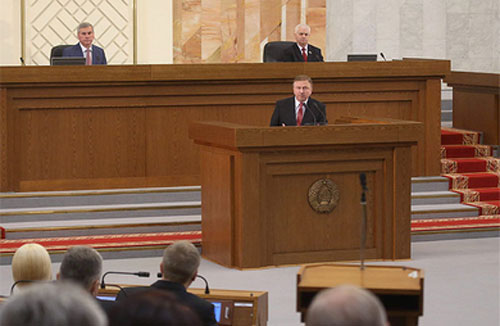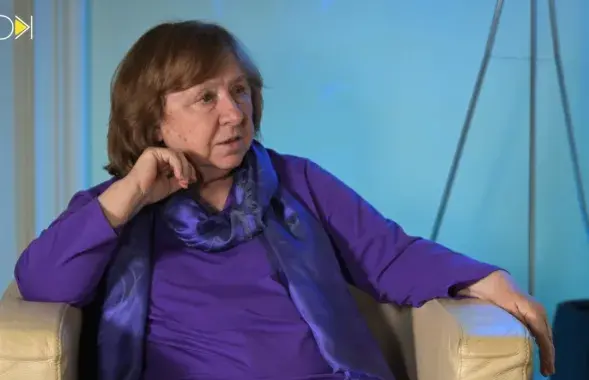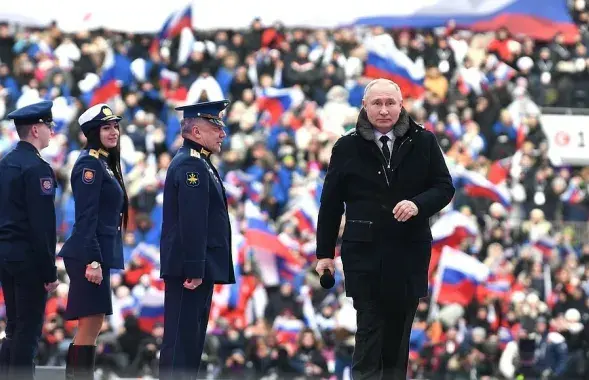Government program: oil at $50, inflation at 25%, less housing construction
Belarusians depend on Western sanctions against Russia, say Belarusian government officials.
On February 25, Belarus Prime Minister Andrei Kabyakou presented in the parliament Government the action program for 2015. From the outset, apparently to avoid the blame, Prime explains that this program is not planned for "manual control". The idea is that "reports and figures are not as important as the result - every person at their workplace must make decisions quickly, work for profit, profitability, export growth and diversification". And he warns that:
"A feature of the program is the personal responsibility of ministries and concerns for the development and implementation of sectoral policies. The second important thing is strengthening of the role of ministers, governors and business leaders in making and implementing decisions."
But then it became interesting. For example, when the budget was being approved, there were many concerns about the expected oil price of $83 per barrel. Then, responding to a question from Euroradio, the Finance Minister Uladzimir Amaryn argued that expectations of the price have to do with economic forecasts of experts. At the same time, the barrel already cost about $70. It is now clear that the experts were wrong.
Andrei Kabyakou: "After the collapse of oil prices on the world market, the planned budget revenues fell. In addition, the Russian economy with its dependence on the oil market profits slows down and reduces imports, including of the Belarusian products. Russian experts estimate the decline in imports in Russia at 30%. In this regard, as a base for economic policy we have adopted the following scenario - $50 per barrel and 62 Russian rubles to the dollar."

If oil is more expensive, says the Prime Minister to the deputies, the Government "in the second half of 2015 will soften the economic policy, restoring some budget allocations". But this is an optimistic scenario. There is also a pessimistic one, admits to the Euroradio journalist on the sidelines of the parliament member of the Budget Committee, Valer Baradzenya. Based on that scenario, a barrel will cost $20. But it was not mentioned to the deputies by Andrei Kabyakou this time. Apparently, it was done so they would not worry, knowing that this year our country has to pay $4 billion of state debt. In 2014 only, Belarus lost more than $ 1.5 billion through a reduction in exports to Russia. By the way, even for our MPs and ministers it is no secret that this is the result of Western sanctions against Russia over its involvement in the conflict in Ukraine.
According to the minister, in the period from January 1 to February 17, the Belarusian ruble "weakened" by 25%, but prices rose by only 3.3%. Kabyakou merits this fully to the Government, saying that "due to the tight monetary policy, they managed to contain the inflation wave". However, Kabyakou does say what would happen if the ban on the rise in prices is lifted. And it's not the only thing that goes unnoticed or is not explained by the Prime Minister. Kabyakou said that there was established "the so-called club of creditors to clear the balance of 106 largest enterprises-debtors - measures for refinancing of their foreign currency obligations are developed". It is done to save these enterprises. And he adds that some companies "have to accept non-standard solutions". What the measures and the companies are, still remains unanswered.
In general, during the presentation of the program to the deputies, the prime minister spoke very briefly. The idea being that the deputies knew it well, and it was already at the site of the Council of Ministers - go and look. But the deputies still had questions. Deputy Valyantsina Zhurauskaya wondered what the government will do to preserve the standard of living of ordinary Belarusians. Premier promised that pensions, scholarships, salaries, subsidies for utilities and transportation will be provided for "in full". Another thing, he acknowledged that "a decision on a certain wage indexation will be made to the possible extent". But the construction of housing for the large families does not look that good, added the Prime Minister, responding to a question of MP Yury Daragakupets.
Andrei Kabyakou: "It was planned to build in 2015 2.5 million square meters of housing with state support. But the financing plan is being optimized, so the forecast of this housing construction has been adjusted downwards - by about 30 percent."
But he said that the principle of social justice is preserved, and that large families with many children and other "vulnerable groups of people" will be given as many apartments as was originally planned.
Prime Minister did not rule out that the republican budget may be adjusted. But only time will tell in what direction. The same is true about the cost of a barrel of oil, the Russian ruble and the level of Western sanctions against Russia, if the conflict in Ukraine is not settled.
Photo: www.government.by

















